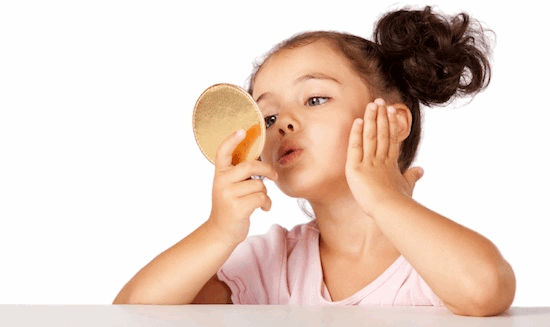“Mommy, I’m Ugly!” — Building Your Child’s Self-Esteem
December 16, 2011
… written by Ava Parnass and Jessica Marr.
Here’s one moment that all Moms dread: you’re standing next your daughter, and she looks in the mirror and says “Mommy I’m Ugly!” As a child psychotherapist and Mom myself, I’m very familiar with this scenario. So when I recently encountered another Mom’s tweet that read, “My daughter said ‘Mommy, I’m Ugly!’” I felt compelled to share what it probably means, and specific techniques that can help our children build their self-esteem.
When your daughter doubts her appearance, your heart sinks, and your first impulse is to say, “That’s not true, you’re so beautiful. Why would you say that?” Every Mom worries that this is the first step on the long road to poor self-esteem.
Do you remember the scene in “Alice In Wonderland” when Alice falls down the Rabbit Hole? That’s what happens to a child’s self-esteem when they experience what I call “hard feelings,” and don’t have the skills to deal with them. These pivotal moments, when handled well, can positively impact the course of your child’s life.
I won’t blame parents or the media here. In fact, this discussion is completely separate from the realm of appearances, because what’s really happening lies beneath the surface. When children experience what are for them unmanageable feelings, those feelings can easily become transformed into thoughts like “I’m ugly.” If they’re not handled correctly, those emotions are then acted out in a variety of ways.
Self-esteem, as you may know, comes and goes — sometimes all of us feel good about ourselves and sometimes we don’t. Therefore, what we really need to teach our kids is resilience, so they develop the skills to overcome their “Rabbit Hole” moments and reclaim their self-esteem. Here are the first 3 of 6 steps to take when your child says the dreaded words, “I’m ugly”:
Step 1: Instead of Over-Reacting, Use Time-In Parenting Techniques
Strive to handle this sharp heart-piercing arrow without over-reacting. Some knee-jerk responses include, “Don’t ever say that!” or, “Why would you say that?” Children don’t really know why they say things, so your best bet is to instead discern what’s going on underneath, then learn to talk about feelings in new ways. This is what I call “Time-In Parenting,” a new collection of research-based techniques designed to improve family members’ Emotional Intelligence.
First, you must listen carefully and acknowledge how your child is feeling. After you hear her out fully, say, “I’m sorry you feel that way.” You can also say: “That’s a hard feeling. Let’s talk about it, because it’s not nice to call yourself names. We treat others kindly, and we need to talk to ourselves that way, too.”
Most kids know how it feels when a friend says something mean or they get bullied, so comparing this type of negative self-talk to bullying may help them relate to it more. If your child then points out your own negative self-talk by saying, “But Mommy, you do the same thing!” first thank them for telling you, then make a promise to improve in this area, too.
Step 2: Become a Feelings Detective
After you’ve acknowledged the hard feelings your child is experiencing, begin to address the underlying reasons. Become what I call a Feelings Detective by subtly moving the discussion away from feeling ugly. Say, “Sometimes kids use the words ugly, fat, and hate when they don’t have the words to say what’s really on their minds.”
There are a wide variety hurt feelings that can arise in the course of your child’s day, any of which he or she can easily turn into a negative thought about himself, herself or someone else. Your job is to discover what happened, and find a better way to express it and heal it. Here are some helpful things to say:
- Say, “Let’s figure out together what hurt feelings you’re really trying to tell me about.”
- Ask, “Did something happen at school with your teachers, or when you were playing with friends?”
- Did I do something that hurt your feelings?
- Did someone give you a mean look?
Perhaps your child got in trouble at school, was scolded harshly, or fought with siblings or classmates. Any of these things could provoke a negative self-image. You’d be surprised by some of the things that cause children to think negatively about themselves, and until you ask — and really listen — you may never find out what they are.
Maybe they’re angry because one parent works too much, gets easily distracted, or yells often. You’re probably certain that you’re not mistreating or neglecting your child, but kids have a view different view of the world then adults do. For instance, they often miss you deeply while you’re at work. They’re also egocentric, thinking the world revolves around them, or that everything is their fault, so they often take innocent actions personally. With guidance and practice, they can develop the necessary skills to express their feelings effectively.
Step 3: Find Out What’s Underneath “I Don’t Feel Pretty”
Begin to pinpoint the exact feelings your child is experiencing. Are they angry, sad, hurt, disappointed, lonely, or missing their grown-ups? A child might feel ugly or unwanted because they’re being compared to, or picked on, by their siblings.
Explain to your child, “When you look in the mirror and think you don’t look great, it’s usually because you’re upset about something that happened. Are you angry with Mommy because I didn’t spend enough time with you? Are you missing or angry with Daddy? Often talking badly about yourself is turning your anger inward and we want to work on that.”
If you’re both having trouble figuring it out, you can use Feeling Town Map at back of my book, “My Feelings are Hungry” for choices of feelings or situations that your child may be experiencing.
Stay tuned for Part 2: Empower Your Child to “Climb Out of the Rabbit Hole”
Remember, your child’s self-esteem is built from the twinkle in your eye and your kind voice in their head.




